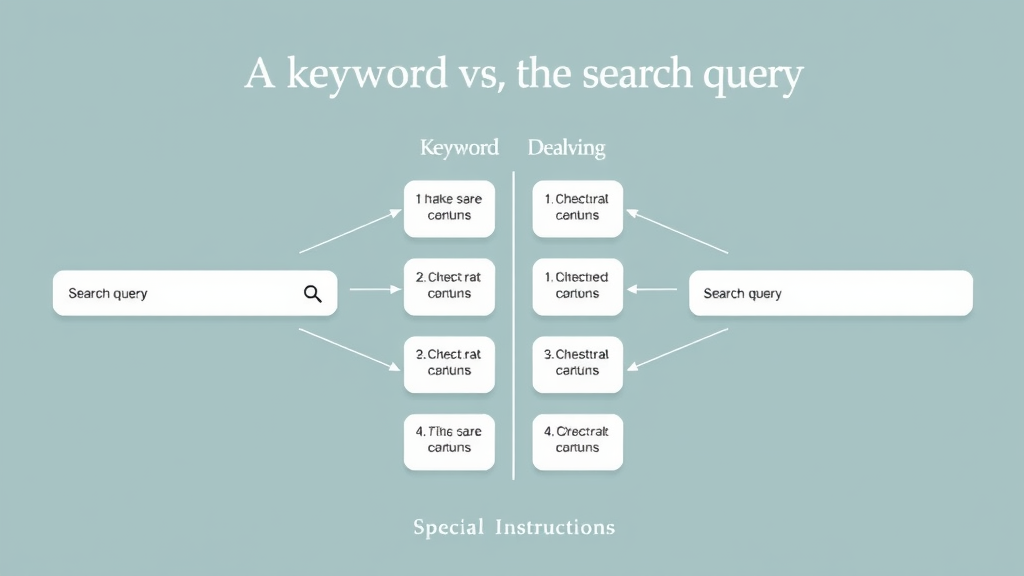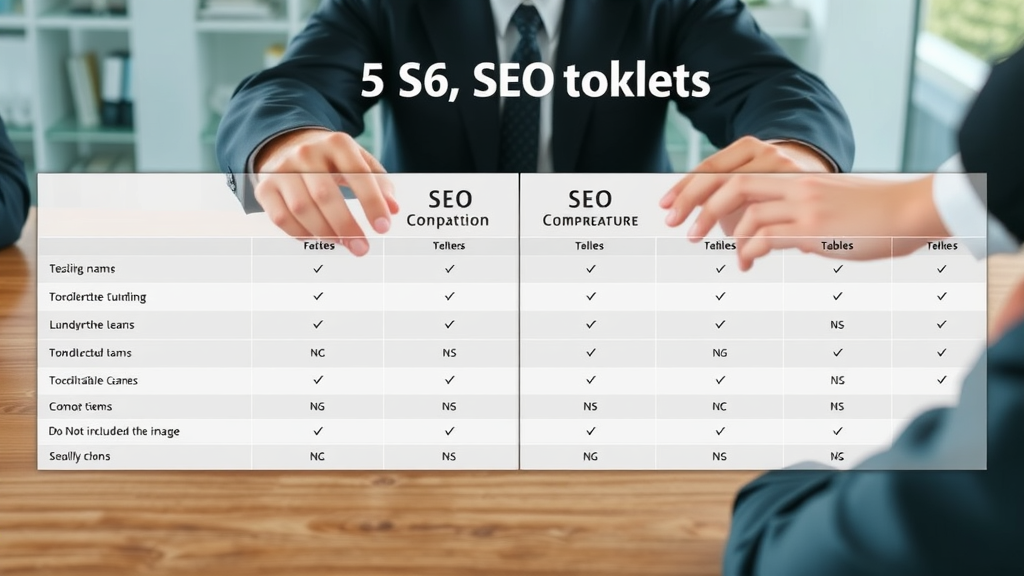Did you know that a significant portion of search engine users struggle to distinguish between keywords and search queries? This confusion often leads to inefficient search strategies and missed SEO opportunities. In this comprehensive guide, we will demystify the differences between keywords and search queries , offering insights to enhance your understanding and improve your digital marketing strategies.
The Importance of Understanding Keyword vs Search Query
Understanding the difference between keywords and search queries is crucial for refining your digital marketing efforts. Keywords are specific terms or phrases that search engine users type into the search box to find information. In contrast, search queries are the actual terms users type into search engines , often reflecting their current needs.
For instance, a business offering digital marketing services may use the keyword "online marketing" to optimize their landing pages . However, when potential customers type "how to improve my digital marketing strategy " into a search engine, this expression becomes a search query. By recognizing the subtle differences, marketers can align their content more closely with user intent, enhancing their overall search presence.
Why Distinguishing Keywords from Search Queries Matters
The distinction between keywords and search queries is vital in optimizing search marketing campaigns . Keywords often serve as a guide for what a page covers, acting as proxy topics for search engines to categorize information. Search queries, in contrast, offer deeper insight into user intent and specific needs.
By understanding both concepts, businesses can craft messages that resonate effectively. For example, by analyzing search query data, companies can identify user trends and adjust their marketing campaigns accordingly. This understanding not only improves SEO strategies but also enhances user experience, contributing to more meaningful interactions with prospective customers.
Real-world Examples of Keywords and Search Queries
Consider the keyword “best coffee machines.” A user might type in a search query like “what’s the best coffee machine for small kitchens” when actively seeking a product recommendation. Here, the keyword is broad, while the search query offers a window into specific user needs.

Demystifying Search Terms and Search Queries
While keywords refer to predefined terms, search queries encompass the real-time expressions internet users input while engaging in information-seeking behavior. Breaking down the stages in which search terms evolve into queries is essential for refining search strategies.
Breaking Down the Concept of a Search Term
A search term refers to the words or phrases that marketers aim to target in their SEO strategies. These terms are often carefully selected based on search volume, relevance, and competitiveness. Search terms form the foundation upon which effective SEO strategies are built, guiding the creation of content that aims to answer user questions and needs.
For example, a website selling books may use the search term “buy books online” to target potential customers looking to purchase books from the comfort of their homes. Though search terms are crucial in strategy formulation, understanding the nuances when they manifest as search queries allows marketers to make data-driven decisions.
How Search Queries Influence Online Visibility
Search queries directly influence how visible a piece of content becomes in search engine results. When these queries align well with targeted keywords, they enhance a page's chances of ranking higher. A well-optimized website that anticipates and matches user query patterns benefits enormously by achieving better search rankings.
Such strategies not only leverage the effectiveness of targeted keywords but also mirror the language and concerns of the target audience. By leveraging data from search queries, marketers can adjust their strategy to focus on emerging trends and frequently asked questions.
Exploring Keywords: Essential SEO Components
Keywords serve as the backbone of SEO, functioning as the foundational elements that inform both content creation and optimization techniques. Understanding these components is vital for implementing sound search engine strategies.
Keywords in Context: Understanding Their Role in SEO
In SEO, keywords act as signals that communicate page content to search engines . These markers are integral to achieving higher relevance scores in search algorithms. As components nurturing the link between user intent and content offerings, keywords ensure that users find relevant content when executing a search query .

Effective use of keywords can enhance brand visibility and drive organic traffic. By strategically placing them within website content, meta descriptions, and alt tags, marketers can leverage keywords effectively.
Choosing the Right Keywords: Best Practices
Selecting the right keywords involves a combination of quantitative and qualitative analyses. Begin by conducting keyword research to analyze factors like search volume and competition. Next, assess each keyword's relevance to the content and overall marketing goals. Employing tools like Google’s Keyword Planner can facilitate this process.
In addition to quantitative data, marketers should consider the commercial intent behind each keyword. While some keywords may generate high traffic, those reflecting purchase intent generally offer greater value. This nuanced understanding underpins successful marketing strategies.
Difference Between Keywords and Search Queries
The fundamental difference between keywords and search queries lies in their application within the digital marketing landscape. Recognizing these distinctions allows marketers to develop successful strategies tailored to user behavior.
Explaining the Nuances: Keywords vs Search Queries
Keywords are terms marketers use to attract traffic. They represent the umbrella terms that categorize content, making it accessible to users through search engines. Search queries, conversely, are the phrases users type into the search bar , reflecting their organic search intent.
These elements work collaboratively but serve different functions. Effective digital marketing requires marketers to balance their approach, focusing on both keyword targeting and search query analysis to engage users successfully.
Difference Between Keyword: A Closer Look
Keywords are strategic elements marketers harness for SEO benefits, while search queries offer invaluable signals about what audiences truly want. This creates an opportunity to bridge intent and content, fostering more relevant interactions.
Understanding the difference allows businesses to craft more targeted content, aligning web pages with actual user interests and needs. It's a process of evolving from static marketing approaches to dynamic, responsive tactics based on real-time data.
Keyword Queries: Unveiling Their Significance
Keyword queries continue shaping the digital marketing sphere by informing content strategies and search engine rankings. Delving into their significance reveals opportunities for improving visibility and engagement.
What is a Keyword Query?
A keyword query encompasses the keywords users type to locate specific content or products. In essence, they are the search's backbone, driving relevance and discoverability of web content.
These queries help search engines determine which content best fits a user's needs, signaling which pages to show in search results. As a core component of SEO, keyword queries play a central role in achieving marketing objectives like driving organic traffic or increasing leads.
The Role of Keyword Queries in Google Ads
In platforms like Google Ads, keyword queries are pivotal for fine-tuning ad targeting. They enable marketers to reach potential customers efficiently by identifying the precise words that trigger placement opportunities. This relevance translates into higher click-through rates and potentially better return on investment.
Marketers glean insights into popular queries through tools like the Search Terms Report, allowing for the optimization and refinement of ad content to reflect ongoing search trends. This iterative process ensures a dynamic and impactful ad strategy.
Impact of Search Queries on SEO and Marketing
Search queries drive marketing innovations, challenging businesses to improve their approaches continuously. By influencing how content appears in search engines, they become essential drivers of digital strategies.
Search Queries in the Digital Marketing Landscape
Adapting strategies to align with search queries enhances engagement and ensures content remains relevant. Through informed analysis, marketers can fine-tune messages and improve tactical efforts like content marketing and SEO.

Keeping abreast of shifts in user behavior remains critical to marketing success. Integrating this data helps attain a competitive edge by consistently delivering what audiences seek in viable formats.
Utilizing Search Queries for Enhanced Audience Targeting
Search queries offer unparalleled insight into what users type into search engines , providing data for more precise targeting. By aligning this insight with marketing content, businesses can engage more deeply with audiences.
When leveraged properly, search queries allow for crafting tailored campaigns that resonate with prospective buyers, thereby achieving better marketing outcomes and positioning businesses strategically in the market.
PAA: What is the difference between a search and a query?
Although often used interchangeably, a search involves the action performed with the intent to find information, while a query refers to the exact string of words entered into a search engine.
Clarifying the Difference for Better Search Strategies
Recognizing the dichotomy between searches and queries ensures that campaigns are optimized efficiently. Understanding user intent through queries elevates content strategies and orchestrates search engine efforts for maximum effectiveness.
PAA: Is a keyword a word found in a search query?
Yes, keywords can be part of what users type in a search query. In essence, keywords often appear as components of broader search queries performed by users.
Analyzing the Relationship Between Keywords and Search Queries
The seamless interplay between keywords and search queries enables marketers to refine SEO strategies for better visibility. Keywords act as fundamental building blocks that enrich search queries, resulting in improved ranking potential.
PAA: What is a keyword query?
A keyword query is the keyword or collection of phrases entered into a search engine intended to find specific information or resources.
Defining Keyword Queries and Their Impact on Search Quality
Keyword queries play a crucial role in enhancing search quality by directing traffic to the most relevant results. Understanding how these queries function ensures consistent delivery of high-quality, targeted content.
PAA: What is a search queries?

Search queries are direct reflections of user intent expressed within the framework of digital search engines. They can vary widely, from single keywords to complex phrases, characterizing how users interface digitally.
Understanding Search Queries in Dynamic SEO Strategies
Adapting to dynamic SEO strategies enables the optimization of content around evolving search queries. This responsiveness ensures businesses satisfy emerging demands and stay ahead of market shifts.
Featured Quote
"The nuanced understanding of keywords and search queries serves as a cornerstone for effective digital marketing."
Utilizing Data Tables for Visualization
| Criteria | Keyword | Search Query |
|---|---|---|
| Definition | Predefined terms guiding content | User-entered phrases indicating intent |
| Purpose | Guides search engine categorization | Reveals specific user needs |
| Optimization | Used in SEO to increase visibility | Analyzed for refining strategies |
Key Takeaways from Keywords and Search Queries
- Keywords serve as essential SEO elements, helping structure content.
- Search queries reflect user needs, aiding in targeted marketing.
- A thorough understanding of both concepts boosts digital marketing efficiency.
Incorporating Keywords and Search Queries into SEO Strategy
Incorporating both keywords and search queries into a cohesive SEO strategy enhances outreach effectiveness and aligns digital content with user expectations.
Implementing Effective Strategies for Keyword Research
Foundational keyword research involves identifying high-potential terms that align with business objectives. Tools like Google Analytics assist in identifying opportunities. By prioritizing intent-driven keywords, businesses can enhance user engagement, delivering compelling marketing results.

Optimizing Content Around Search Queries for Better Engagement
To boost engagement, optimizing content requires keen analysis of actual user queries. This entails developing content that addresses frequently asked questions and other prevalent user search behaviors.
FAQs on Keyword vs Search Query
Why is understanding the difference between keywords and search queries crucial?
Grasping this difference informs more accurate SEO strategies, elevates content relevance, and drives successful marketing campaigns by aligning efforts with actual user intents.
How do search queries evolve over time?
Search queries evolve as language trends, technology, and user behaviors shift, necessitating adaptive strategies to maintain relevance and ensure continual audience engagement.
Can search queries provide insights into consumer behavior?
Yes, search queries offer rich insights into consumer behavior patterns. They reveal immediate user concerns and can illuminate broader market trends to inform marketing decisions.
Comprehensive Summary
Integrating Keywords and Search Queries for Success
Integrating an understanding of both keywords and search queries within your SEO strategy is imperative for maximizing digital marketing effectiveness and achieving long-term success.
 Add Row
Add Row  Add
Add 




Write A Comment